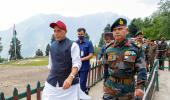By offering aid to China in its hour of need we will create an opening to Xi Jinping to rectify his policy towards India, argues Colonel Anil A Athale (retd).

In 1938 as China was battling the Japanese invasion, the Chinese Communist party requested medical help from India.
At the instance of Subhas Chandra Bose, the then president of the Congress party, a medical team of five doctors led by Dr M Atal from Allahabad and Drs Cholkar, Kotnis, Basu and Debesh Mukherjee were sent to China in September 1938.
All, except Dr Kotnis, returned to India safely. Dr Kotnis stayed on and the for next five years continued to help the Chinese.
In one long-drawn-out battle against Japanese troops in 1940, Dr Kotnis performed operations for up to 72 hours, without getting any sleep.
He treated more than 800 wounded soldiers during the battle. Even today his memory is revered in China and is a symbol of India-China friendship of a bygone era.
As China battles a COVID-19 surge, India has a rare opportunity to set a new path for a long term future relations with China.
It is an opportune time for India to offer help with its vaccines and other expertise to deal with the emergency situation in China.
India is indeed uniquely placed to offer both medicines as well as expert manpower.
It is time for India to live up to its civilisational motto of 'vasudhaiv kutumbakam (the world is one family)'.
Sino-Indian tensions on the border are more a creation of the Chinese Communist party with most Chinese citizens indifferent.
This is unlike say Pakistan where a section of its population is hostile to India and wedded to concepts like Gazwa e Hind (conquest of India as mentioned in Hadis).
Some years ago, I had an opportunity to listen to a Chinese professor at the Savitribai Phule university in Pune on the Chinese perception of India. The learned professor made a very interesting point.
According to him a full 40% of Chinese are practicing Buddhists. For this segment of China's population, India has the status of the holy land associated with Buddha.
There is no palpable 'anti-India' sentiment in China.

India will have to be sensitive in the way we offer help.
There should be no triumphalism of any kind to hurt Chinese pride.
This will be an ideal opportunity for us to go over the heads of the Communist party which has been following a short-sighted policy of hostility with India to fulfill its global ambition.
Sceptics may doubt the efficacy of this approach given the fact that the Chinese Communist party has a tight grip over the country and controls the media.
The recent unrest and public demonstrations over the 'Zero Covid' measures in China ought to prompt a rethink on this issue.
Despite its control, the protests over the Covid policy were widespread in China and obviously effective as Xi Jinping was forced to change policy and relax restrictions.
In the worst-case scenario, the Chinese government may well reject the help, but we would have made our point.

As someone who was briefly part of a track II dialogue with the Chinese, I strongly feel that the Galwan clash of two years ago was an accident and while the Chinese certainly were the aggressors, they were surprised by the strong Indian response and possibly regret the mistake.
It is also entirely possible that it was part of an internal power struggle in China.
By offering aid to China in its hour of need we will create an opening to Xi Jinping to rectify his policy towards India.
In any case, the Indian aid offered to China is an initiative that can do no harm even if it fails.
Colonel Anil A Athale (retd) is a military historian whose earlier columns can be read here.
Feature Presentation: Aslam Hunani/Rediff.com











 © 2025
© 2025